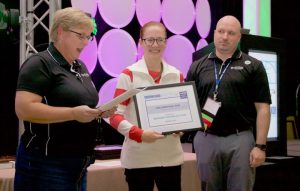What is your volunteer position for 2018 and how would you explain it to someone new to SIGUCCS?

I am the Poster Track Chair. I didn’t know what this meant until I started doing it, and love it so far. For conference participants who have Poster Presentations in 2018, I am helping coordinate and complete readings of their required papers, getting them ready for publication, and then will help assist with the long-distance coordination and assembly of actual posters for the conference.
How many SIGUCCS conferences have you attended?
4
How did you get involved as a volunteer in SIGUCCS?
I helped chair sessions in 2016, looking for a way to engage myself in sessions I might not otherwise attend. During 2017 a last-minute volunteer coordinator was needed. One of my colleagues knew I’d done similar work in my swing-dance pursuits, and volunteered me!
What’s an accomplishment that you are especially proud of?
We just implemented mandatory two-factor authentication on campus and had an aggressive deadline and goal – have 80% of our student population voluntarily enrolled by the date we said we’d require 2FA. With just over a month for publicity, events, and outreach (spanning our spring break) we hit our goal just in time!
Something that you could always stop and talk to me about
Lindy Hop (swing dancing) – it’s a hobby and passion that has taken me across the country and around the world!
What do you do for fun?
Board Gaming, Traveling, Swing dancing, Curling, Knitting & Crocheting, Random DIY Home Improvement, Occasional woodworking, Handbell choir ringing – and whatever new adventures lie ahead!
 SIGUCCS 2018 Orlando … who is your favorite Disney character?
SIGUCCS 2018 Orlando … who is your favorite Disney character?
MOANA!!!














